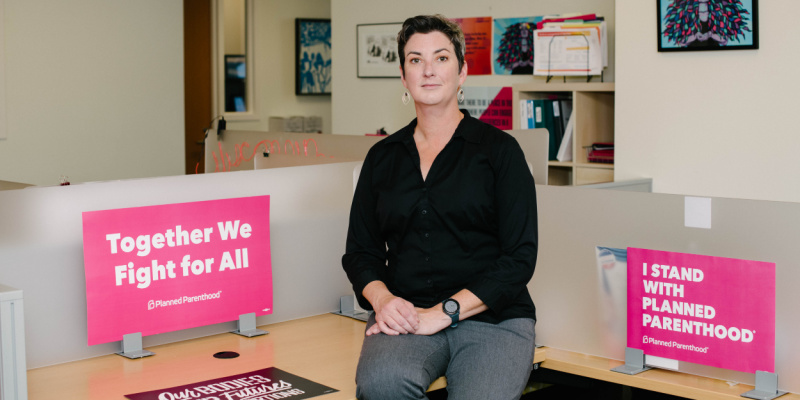By Jessica Steinhoff | Photo by Hillary Schave
June 24, 2022. It’s a day women of our era will remember, whether they want to or not. The Supreme Court handed down its decision on Dobbs v. Jackson Women’s Health Organization, ruling that there is no constitutional right to an abortion. Decades of legal precedent, including 1973’s landmark Roe v. Wade decision, were overturned as the states became the ultimate deciders on whether abortion is allowed within their borders. Wisconsin reverted to an 1849 law that makes performing an abortion a felony except when necessary “to save the life of the mother.” (An ectopic pregnancy, which is when a fertilized egg implants outside the uterus, or, if a fetus is deceased, are both considered non-viable pregnancies and require immediate medical intervention. This intervention is not considered an abortion because the pregnancy is not viable.)
Few Supreme Court decisions have carried so much weight or changed the status of so many people overnight.
Change is rarely easy or comfortable, but this is no ordinary shift. Here in Dane County, many women have questions about what it means for them, their families and their futures.
Then there rarer the women who aren’t asking questions since they haven’t gotten the memo. Natalee Hartwig, associate director of clinical services at Planned Parenthood of Wisconsin, meets a lot of women in this camp. Breaking the news that they cannot obtain an abortion anymore in Wisconsin can be tough.
“We have patients who are surprised that they can’t get an abortion at our East Madison clinic, which used to offer them, or anywhere else in the state,” she says. “It’s often the people who need care the most who don’t know about these limitations until they are faced with them, and then it takes longer for them to plan what to do next.”
The longer it takes for a patient to figure out if they want to carry a pregnancy to term, the fewer options they may have, she adds. And, there are so many questions to answer when deciding whether to become a parent. Even in the best of circumstances, it can feel overwhelming.
WHAT LOCAL WOMEN WANT TO KNOW
Navigating the new health-care landscape Dobbs has created can also feel bewildering. It’s riddled with thorny questions: How endangered must a woman’s life be for her doctor to consider abortion? What if the fetus has a fatal medical condition? What if the pregnancy resulted from rape or incest? Will emergency contraception be banned? What’s the outlook for couples trying to conceive through in-vitro fertilization, or for women who need medications known to cause birth defects?
Sarah Hughes, a program supervisor at Public Health Madison & Dane County (PHMDC), says nurses in its East Washington location’s Sexual and Reproductive Health Clinic have noticed how worried many patients have become. In particular, patients worry how Dobbs might affect care for complicated pregnancies. Meanwhile, staff answering the clinic’s phone are fielding questions about how to access abortion services now that the law has changed.
Some questions just don’t have a clear answer right now, Hughes admits. “I’ve gotten lots of questions about receiving [abortion] medication via mail and transporting people across state lines for abortion services, and it’s not clear exactly what’s legal and what isn’t,” she says. “The uncertainty can make things feel fragile and scary, so we’ve been working closely with our legal counsel and directing people with especially difficult questions to other organizations, such as Planned Parenthood, that might be better equipped to answer them.”
At Wisconsin Right to Life, an organization that opposes abortion and educates people on alternatives to abortion, one of the most common questions from local women is, “Where can I get help if I’m pregnant and struggling?”
“They often want to know if we provide direct assistance, especially assistance with housing or child- care,” says Legislative Director Gracie Skogman. “We often refer these women to pregnancy resource centers near where they live, which offer things like ultrasounds, diapers and counseling.”
Skogman says one pregnancy resource center her organization partners with has seen a 40% increase in clients since Dobbs was handed down. She anticipates this trend will continue, creating a need for more resources. That’s one reason she’s helping to build a statewide coalition of these centers. Currently, Skogman says the vast majority of counties in Wisconsin have at least one pregnancy resource center, with some counties having multiple locations.
“A coalition will make it easier to get support directly to these centers,” she explains. “For example, if we hear that a pregnancy resource center in Dane County has a client who wants to choose life but is struggling with rent, we can offer her a housing grant.”
Unlike other medical clinics, pregnancy resource centers don’t present abortion as an option when counseling pregnant women. They also don’t refer clients to abortion providers. In contrast, Planned Parenthood connects women with out-of-state abortion providers if they decide against giving birth. Now that most pregnancies can’t be terminated in Wisconsin, they’re rethinking how to provide the best possible care.
Like many of her colleagues, Planned Parenthood’s Hartwig, a certified nurse-midwife, is traveling to Illinois to provide abortions.
“I go to Illinois once a week to do medication abortions, plus another day to help with in-clinic abortions,” she says. “We’re seeing a lot of patients from Wisconsin there, especially at the Waukegan Planned Parenthood clinic just across the border — as well as patients from Indiana, Ohio, Kentucky, Missouri, Tennessee and Arkansas.”
Some of the most difficult situations concern serious chronic health conditions, she reports. One such scenario involved a patient from Wisconsin who’d scheduled a medication abortion at an Illinois Planned Parenthood clinic.
“She had such severe hypertension that she was at risk of having a stroke, and she was really distraught when I told her I couldn’t do the abortion that day,” Hartwig recalls. “An abortion wouldn’t have been safe at that time, but a term pregnancy would also be terrible for her. She needed help getting her blood pressure under control but didn’t have adequate access to the primary care that could help her with that.”
According to Hartwig, Wisconsin-based patients have less access to primary care than those from Illinois and other states that expanded their Medicaid programs to cover more low- income households.”.
“It’s frustrating because the same states that didn’t expand Medicaid often are where abortion is inaccessible right now,” she says.
Wisconsin does offer BadgerCare Plus, which is a health care coverage program for low-income households. Children under 19 automatically qualify as do pregnant women in lower-income households, as well as other select groups of individuals.
SEARCHING FOR SOLUTIONS
For some, having little to no primary care means little to no access to reliable contraception. Planned Parenthood’s South Madison clinic helps fill the gap, and the East Madison clinic also offers contraception consultations in addition to the ultrasounds, miscarriage management and the post-abortion care it already provides.
The PHMDC clinic’s Sexual and Reproductive Health program is also expanding its hours and resources to prevent more unplanned pregnancies. Hughes says this effort is backed by strong data as well as good intentions.
“Several years ago, Colorado started offering free, long-acting reversible contraception, or LARC, at public health clinics and saw amazing outcomes, including a lower need for abortion services, fewer teen pregnancies and a lower preterm birthrate,” she says. “We know that making contraception readily available can make a big difference in preventing unintended pregnancies, and since abortion is no longer available in Wisconsin, now is the time to act.”
In addition to hiring more staff and staying open eight extra hours per week, the clinic intends to offer LARC such as intrauterine devices (IUDs) and implants in 2023. PHMDC is also considering offering family-planning services at a clinic on Madison’s south side.
Looking ahead, Skogman sees opportunities for bipartisan legislation about paid family leave and child care now that more people may be bringing children into the world. In her view, it’s also an ideal moment to change the tone of national discourse about women.
“Women deserve compassion and care, especially when facing the challenges that can come with carrying a pregnancy to term, and it all starts with how we talk about the issue,” she says. “It’s important to acknowledge these challenges and show pregnant women that they are truly supported.”
RESOURCES
A website run by Wisconsin Right to Life for pregnant people seeking assistance, grants and health care in their area.
Type in your location to find the clinic closest to you that performs abortions.
Planned Parenthood of Wisconsin
Find information on clinics in Wisconsin, sexual health and pregnancy questions, and health care services. ppwi.org
Public Health Madison & Dane County Sexual Health Program
Provides testing and treatment for STIs, contraception and sexual health supplies. publichealthmdc.com/health-services/sexual-health
Wisconsin Right to Life
An organization whose mission is to “make euthanasia, infanticide, abortion and destruction of human embryos socially, ethically and legally unacceptable solutions to human problems and to promote positive alternatives to each of these acts.” wisconsinrighttolife.org


